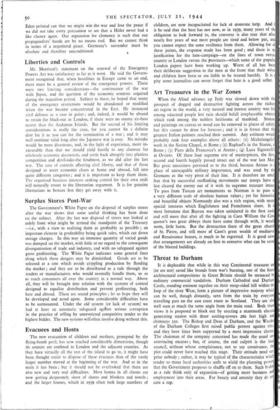Liberties and Controls
Mr. Morrison's statement on the renewal of the Emergency Powers Act was satisfactory as far as it went. He said the Govern- ment recognised that, when hostilities in Europe came to an end, there must be a general review of the emergency powers. There were two limiting considerations—the continuance of the war with Japan, and the question of the economic controls required during the transition period. Subject to these, he hoped that many of the emergency restrictions would be abandoned or modified when the war became concentrated in the East. He instanced civil defence as a case in point ; and, indeed, it would be absurd to retain the black-out in London, if there were no enemy air-base nearer than the Andaman. Islands. But the second of his limiting considerations is really the crux, for you cannot fix a definite date for it as you can for the termination of a war ; and it may well continue valid long after the Japanese war is over. No mistake would be more disastrous, and, in the light of experience, more in- excusable than that we • should yield hastily to any clamour for wholesale economic decontrols, and rattle back abruptly into planless competition and devil-take-the hindmost, as we did after the last war. The case of controls affecting civil liberty, and that of those designed to avert economic chaos at home and abroad, fall into quite different categories ; and it is important to keep them there. The organised business interests seeking control for their own ends will naturally resort to the libertarian argument. It is for genuine libertarians to beware lest they get away with it.






















 Previous page
Previous page